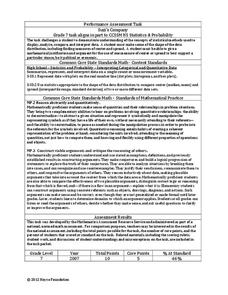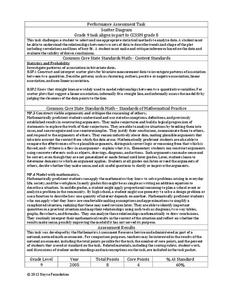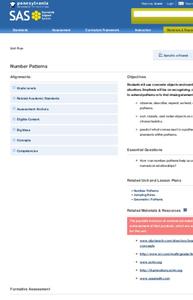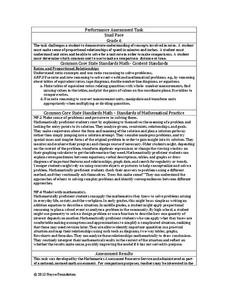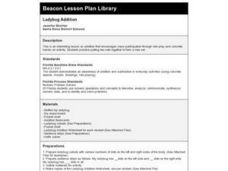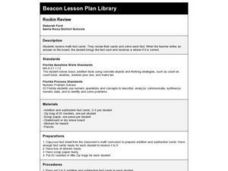Inside Mathematics
Archery
Put the better archer in a box. The performance task has pupils compare the performance of two archers using box-and-whisker plots. The resource includes sample responses that are useful in comparing individuals' work to others.
Noyce Foundation
Boxes
Teach your class to think outside the box. Scholars use the concept of equality to solve a problem in the assessment task. They determine how to use a scale to identify the one box out of a set of nine boxes that is heavier than the others.
Inside Mathematics
Rhombuses
Just what does it take to show two rhombuses are similar? The assessment task asks pupils to develop an argument to show that given quadrilaterals are rhombuses. Class members also use their knowledge of similar triangles to show two...
Inside Mathematics
Graphs (2006)
When told to describe a line, do your pupils list its color, length, and which side is high or low? Use a worksheet that engages scholars to properly label line graphs. It then requests two applied reasoning answers.
Inside Mathematics
Quadratic (2006)
Most problems can be solved using more than one method. A worksheet includes just nine questions but many more ways to solve each. Scholars must graph, solve, and justify quadratic problems.
Inside Mathematics
Party
Thirty at the party won't cost any more than twenty-five. The assessment task provides a scenario for the cost of a party where the initial fee covers a given number of guests. The class determines the cost for specific numbers of guests...
Inside Mathematics
Suzi's Company
The mean might not always be the best representation of the average. The assessment task has individuals determine the measures of center for the salaries of a company. They determine which of the three would be the best representation...
Noyce Foundation
Which is Bigger?
To take the longest path, go around—or was that go over? Class members measure scale drawings of a cylindrical vase to find the height and diameter. They calculate the actual height and circumference and determine which is larger.
Noyce Foundation
Parallelogram
Parallelograms are pairs of triangles all the way around. Pupils measure to determine the area and perimeter of a parallelogram. They then find the area of the tirangles formed by drawing a diagonal of the parallelogram and compare their...
Inside Mathematics
Scatter Diagram
It is positive that how one performs on the first test relates to their performance on the second test. The three-question assessment has class members read and analyze a scatter plot of test scores. They must determine whether...
Inside Mathematics
Quadrilaterals
What figure is formed by connecting the midpoints of the sides of a quadrilateral? The geometry assessment task has class members work through the process of determining the figure inscribed in a quadrilateral. Pupils use geometric...
Curated OER
Seesaw Balances
Students determine how the weights of 7 objects on a seesaw can vary and still be in balance. They also write equations in algebraic terms, how to change 3 variables in an equation expressed in algebraic terms to obtain the correct...
Inside Mathematics
Rugs
The class braids irrational numbers, Pythagoras, and perimeter together. The mini-assessment requires scholars to use irrational numbers and the Pythagorean Theorem to find perimeters of rugs. The rugs are rectangular, triangular,...
Curated OER
Number Patterns
First graders use manipulatives to complete and extend patterns. In this patterns lesson plan, 1st graders complete a pattern with a missing element, extend a pattern, and sort objects by characteristics.
Noyce Foundation
Snail Pace
Slow and steady wins the race? In the assessment task, scholars calculate the rates at which different snails travel in order to find the fastest snail. Hopefully, your class will move much more quickly in finishing the task!
Curated OER
Giggle, Giggle, Quack Pizza Fractions
Students explore the concept of multiplication by using pizza. They read an article discussing how math is used everyday. They try to determine how many pizzas they would need to feed the class.
Curated OER
Pattern Detectives
Students discover patterns in language, math and science. They experience patterns by hearing stories, and becoming pattern detectives.
Curated OER
Measure Me!
Third graders use nonstandard concrete methods to estimate and record measurements of their body.
Curated OER
Place Value: A Place for Apples
Second graders explore number values by completing math worksheets. For this place value lesson, 2nd graders identify the use of decimals in numbers and read a book about math called Apple Pigs. Students create number charts based on the...
Curated OER
Ladybug Addition
Students engage in an interesting lesson on addition that encourages class participation through role-play and concrete hands-on activity. They utilize the fact that ladybugs have dots on their bodies to create a fun, hands-on lesson in...
Curated OER
Arrange the Classroom (Part 1 of 3)
Fifth graders arrange the classroom using all the moveable objects and through the exploration of area and perimeter. They determine the area of the classroom, create and label model pieces of furniture using graph paper, and create a...
Curated OER
Rockin Review
First graders practice math facts by matching a written fact with a math fact card.
Curated OER
Johnny Appleseed
Students meet and delve into the life of the American Folk Hero, Johnny Appleseed through the activities of the eight lessons of this unit. Math and language activities offering whole and small group encounters.
Beacon Learning Center
Fishing for Tens
Children brainstorm and list pairs of numbers that equal ten. In small groups they play Tens Go Fish, which is like regular Go Fish, except your goal is to make pairs that equal ten. Make math fun with this fishing game! A worksheet is...






